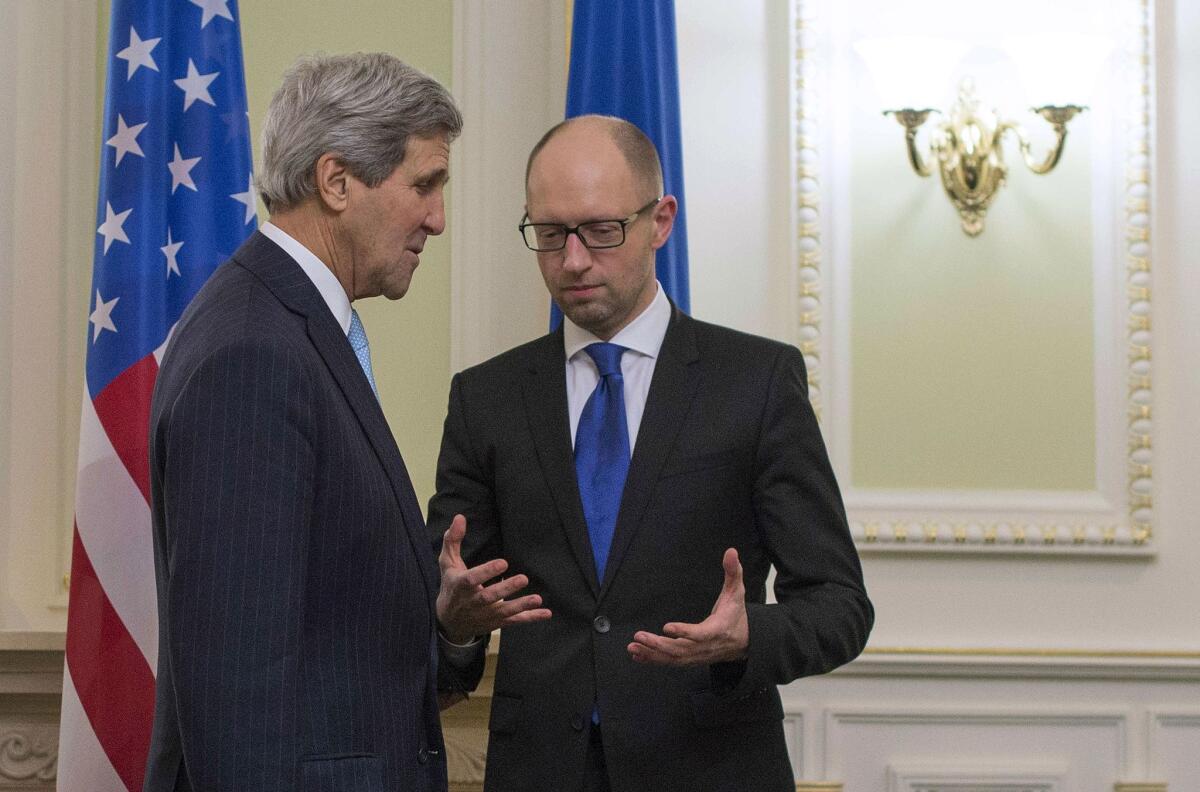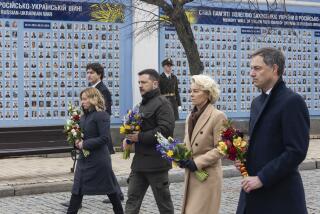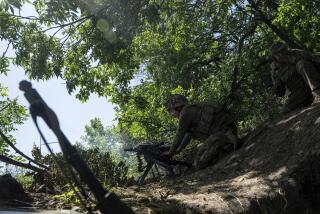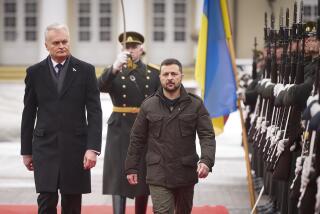In Kiev, Western officials press Ukraine, Russia to end conflict

With the prospect of Western arms supplies to Ukraine looming over the conflict there, top U.S. and European officials descended on snowbound Kiev on Thursday to press the leaders of Ukraine and Russia to negotiate an end to their disputes and avert a worsening of the nearly year-old crisis.
U.S. Secretary of State John F. Kerry insisted that neither Washington nor Europe want confrontation with Russia but that the Kremlin’s hand in the deadly Ukraine fighting cannot be ignored.
“We cannot close our eyes to the tanks that are crossing the border coming into Ukraine,” Kerry said. “We cannot close our eyes to Russian soldiers in unmarked uniforms coming across the border and leading troops into battle.”
Kerry’s first visit to the Ukrainian capital in 11 months coincided with a fresh diplomatic initiative by German Chancellor Angela Merkel and French President Francois Hollande. They flew to Kiev later Thursday to press their plan for a negotiated settlement of the conflict between Ukrainian government forces and pro-Russia separatists.
The diplomatic flurry appeared to have been sparked by renewed White House consideration of sending weapons and advanced technology to the outgunned Ukrainian government forces. The United States so far has supplied only nonlethal assistance such as body armor, night-vision goggles and food rations.
The Obama administration has been reluctant to deepen U.S. involvement in the conflict, which has taken more than 5,300 lives since April.
But recent separatist attacks on civilian communities along the Sea of Azov, which leads to the Crimea region seized by Russia nearly a year ago, have rekindled the debate in Washington over whether to provide Ukraine with more effective means of defending itself. The separatist advances have reportedly been aided by the influx of fighters and weapons from Russia, witnessed by monitors with the Organization for Security and Cooperation in Europe.
On Wednesday, Defense Secretary-designate Ashton Carter told his Senate confirmation hearing that he was “very much inclined” to provide the anti-tank weapons, radar systems and secure communications equipment sought by Kiev leaders.
Other U.S. and NATO military officials, though, are wary of antagonizing the Kremlin. Speaking Thursday at an alliance gathering in Brussels, U.S. Air Force Gen. Philip Breedlove, the North Atlantic Treaty Organization’s top commander, said delivering weapons to Ukraine “could trigger a more strident reaction from Russia.”
Russian Foreign Ministry spokesman Alexander Lukashevich immediately validated that concern, telling reporters in Moscow that any move by Washington to arm Kiev would “inflict colossal damage to Russian-American relations.”
Ukrainian President Petro Poroshenko said before meeting with Kerry that he was highly confident the United States would give Ukraine the materiel to respond to the Russia-backed separatists’ escalating aggression. A candy magnate elected in May to restore order in the country after six months of revolutionary chaos, Poroshenko called the conflict in eastern Ukraine “a testing time for the strategic partnership between Ukraine and the United States.”
But the prospect of U.S. lethal aid to Ukraine is divisive, among American policymakers as well as European allies.
NATO member Poland offered this week to provide arms to Ukraine. Merkel, however, has argued that the conflict needs more diplomatic intervention, not more guns. Hollande, in a sop to Russian President Vladimir Putin, said before embarking on the trip with Merkel that he opposed NATO membership for Ukraine.
Putin sent Russian paratroopers to seize the Crimean peninsula from Ukraine last February and annexed it three weeks later. That move, which has drawn withering economic sanctions and broad Western denunciation, followed the toppling of Kremlin-allied Ukrainian President Viktor Yanukovich and the defeat of Putin’s quest to keep Ukraine from reorienting its economic and security alliances to Western Europe.
Hollande and Merkel canceled a news conference in Kiev, disclosing little about the peace plan they were to carry to Moscow for discussion with Putin on Friday.
Hollande told reporters in Paris that the new blueprint was “based on the territorial integrity of Ukraine,” suggesting that the return of Crimea would be a key element.
That appears to be a nonstarter with Putin, whose approval ratings shot up beyond 80% after the peninsula, which is home to Russia’s Black Sea fleet, was restored to Moscow’s control, even though the change of national borders by force hasn’t been recognized by any other state.
Williams reported from Los Angeles and Richter from Washington. Special correspondent Victoria Butenko in Kiev contributed to this report.
For foreign policy news, follow me at @richtpau
More to Read
Start your day right
Sign up for Essential California for news, features and recommendations from the L.A. Times and beyond in your inbox six days a week.
You may occasionally receive promotional content from the Los Angeles Times.








